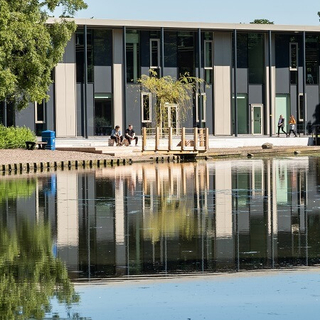MSc Mature Field Management
Skip to section
Key information
- Location
- Edinburgh
- Mode of delivery
- On-campus
- Delivery type
- Full-time
- Start date
- September
- Duration
- 1 year
- Qualification
- MSc
Contact
Contact our enquiries team
Contact usOverview
Developed with experienced industry advisors this Master's in Mature Field Managment is fundamental to the modern petroleum industry.
The bulk of the world's hydrocarbons come from producing assets – so-called 'mature fields'. In turn, these supply the bulk of the world's energy.
Managing these assets is therefore a central aspect of global energy supply and will become more so as the world's giant fields become progressively more mature. Most industry jobs in exploration and production will be in this arena, requiring a talented workforce to fill them for decades to come.
Heriot-Watt's Institute of GeoEnergy Engineering has therefore created a Masters programme to address this need. The topical content is broader than the existing programmes, embracing not only geoscience, reservoir and well engineering but also surface engineering and the linkage between them in the form of Integrated Asset Management (IAM).
The subject also demands a grasp of incremental petroleum economics and risk analysis, and a methodology for handling decision-making in assets in which production and data gathering are continuous. This methodology provides the link between the programme components and sits at the core of the group exercise, with Edinburgh's own Forth Bridge as a visual metaphor for the process.
Finally, the programme deals with the asset endgame. When does production cease, how can field life be extended, how do we decommission (or then recommission?) and what are the potential uses of these reservoirs in the post-carbon era?
September 2025 entry
Unfortunately, this programme is not going to be delivered on-campus in the academic year 2024-25. The next student intake will be for the academic year 2025-26.
This programme will still be available to study online, however (see below).
Flexible study options
This course can also be studied via Online Learning, ideal for those in employment or with other commitments, providing flexible study options that fit around work or family.
Course content
Year 1
Students on the Mature Field Management MSc undertake eight taught courses and two projects.
Taught courses
Brownfield Well and Reservoir Management
The options for extending field life and a view of reservoirs and wells: well drilling, inspection, maintenance, and conformance management; reservoir monitoring and locating the remaining oil using 4D seismic analysis.
Reservoir Engineering
Behaviour of reservoir rocks, fluid properties, reserve estimation, fluid flow through porous rocks and drive mechanisms.
Enhanced Oil Recovery and CO2 Storage
Fundamentals of enhanced oil recovery methods and their modelling principles. Technical aspects of post-carbon use of oil and gas fields for CO2 storage; and the associated decision-making process. Elements of data science through coding and geoenergy-relevant applications.
Field Fluid Chemistry and Surface Facilities
Basics of Oil and Gas field processing techniques and fluid chemistry. Principles of surface production facilities equipment and operations dealing with separation, gas/oil/water handling, flow assurance, corrosion, and CO2.
Production Technology
Well completions and servicing; well performance modelling; artificial lift; perforating; formation damage; well stimulation by matrix treatments and hydraulic fracturing; sand control; introduction into surface facilities.
Reservoir Simulation
Predicting reservoir dynamic behaviour: theoretical, numerical and practical flow simulation for history matching and forecasting. Use of data science in reservoir modelling.
Field Management Strategy and Planning
Fundamentals of petroleum economics, asset value, risk management, making informed decisions, screening and ranking of projects with a focus on mature fields.
Field Modelling and Production Optimisation
Development and assessment of conventional and advanced reservoir models, both static and dynamic, using numerical and analytical methods. Integrated modelling of reservoir, well and surface facilities. Sensitivity and optimization studies to evaluate performance of an asset, identify its bottlenecks, and propose optimal management scenarios.
Projects
Field Management Project
Design a commercially viable field life extension plan to maximise hydrocarbon recovery and/or asset value, constrained by the current conditions of the mature field, while taking into account government regulations and interests of all relevant stakeholders. Apply and integrate specialised learning from the taught courses for a real-world problem.
Individual Project (Dissertation)
Independent research project on a topic (related to mature field management) of the student’s choice.
Mandatory September
- Brownfield Well and Reservoir Management
- Reservoir Engineering
- Enhanced Oil Recovery and CO2 Storage
- Field Fluid Chemistry and Surface Facilities
Mandatory January
- Production Technology
- Reservoir Simulation
- Field Management Strategy and Planning
- Field Modelling and Production Optimisation
Mandatory May
- Field Management Project
- Individual Project
Go Global
Some of our Postgraduate Taught Masters Programmes are eligible for Inter-Campus Transfer. Please contact studywithus@hw.ac.uk for further information.
Fees and funding
Tuition fees
| Status [footnote 1] | Full-time |
|---|---|
| UK | 15112 |
| Overseas [footnote 2] | 29960 |
Additional fee information
All course costs are covered by the tuition fee. This includes full electronic versions of the course notes, core text books, field trips and any day trips arranged as part of the course.
Students should budget additional funds sufficient to cover living expenses such as accommodation, travel to and from the university, food, clothing and leisure pursuits.
Scholarships and bursaries
We aim to encourage well-qualified, ambitious students to study with us and we offer a wide variety of scholarships and bursaries to achieve this. Over £6 million worth of opportunities are available in fee and stipend scholarships, and more than 400 students benefit from this support.
View our full range of postgraduate scholarships.
Entry requirements
Entry
Masters (MSc) level entry applicants must have one of the following:
- Minimum of 2:1 honours degree or equivalent academic qualification in a related subject area.
- For postgraduate conversion courses, non-related degrees will be considered.
- Corporate (or chartered) membership of relevant professional institutions will also be considered
Candidates who do not meet the above entry requirements or have no formal academic qualifications will be considered individually based on their CV and possibly interview. Admission via this route will be at the discretion of the Director of Recruitment.
Recognition of prior learning
We are committed to providing study opportunities to applicants who have a wide range of prior experiences through Recognition of Prior Learning (RPL). For more information on RPL, please contact the Admissions Team (studywithus@hw.ac.uk) ahead of application. We can only consider requests for RPL at the time of application to a course of study.
English language requirements
If English is not the applicant's first language a minimum of IELTS 6.5 or equivalent is required with all elements passed at 6.0 or above. Please refer to English language requirements for further details.
Some applicants may be asked for alternative evidence in line with UKVI recognised English speaking countries. Applicants who have previously successfully completed courses delivered in the medium of English language may be considered and will be required to provide documentary evidence of this. Examples would be secondary school education or undergraduate degree. A minimum of at least one year of full time study (or equivalent) in the medium of English language will be required.
All evidence of English language needs to be dated within two years of the commencement of study.
We also offer a range of English language courses to help you meet the English language requirement prior to starting your master's programme:
- 20 weeks English (for IELTS of 5.0 with no skill lower than 4.5)
- 14 weeks English (for IELTS of 5.0 with minimum of 5.0 in writing and no skill lower than 4.5)
- 10 weeks English (for IELTS of 5.5 with no skill lower than 5.0)
- 6 weeks English (for IELTS 5.5 with no skill lower than 5.5)
Employability
Industry links
The Institute also has an industry-based Strategic Advisory Board who monitors activities in the wider context of the needs of the industry and offer guidance on the course ensuring content is up to date and relevant to current industry needs. Seminar sessions are also conducted by staff from a variety of petroleum engineering companies.
Career opportunities
The courses provide specialist education tailored to the requirements of the upstream petroleum industry, which is undergoing significant changes and faces major challenges when operating mature field managements in the North Sea, Gulf of Mexico, Middle East, Malaysia, East Asia and South America. Petroleum, however, remains the dominant source of energy for our society, with current world production of oil and gas at record rates and increasing volumes coming from existing and mature fields rather than new discoveries.
It is widely recognised that a steady influx of well-trained and industry-aware people with fresh ideas is vital for longer term success and stability of an organisation. The relevance of the education offered by this new MSc course in Integrated Mature Field Management, combined with careful selection of candidates and Heriot-Watt University's long-standing global success in providing graduate training for the petroleum industry, will ensure that operating companies and oilfield service companies will continue to target Heriot-Watt for recruitment of graduates in the future, especially candidates who will be able to make sound technical contributions to the management and operation of mature fields.
Why Heriot-Watt?
Clubs and activities
At Heriot-Watt we have an extensive programme of over 90 sports clubs and societies to get involved in. You can try as many as you like or start one of your own!
Edinburgh campus accommodation
Living on our beautiful Edinburgh campus is a great way to meet others from all over the world. Our student accommodation is within easy reach of the teaching buildings, sports facilities, catering venues and the Student Union
Edinburgh Campus facilities
At Heriot-Watt University, we offer a wide range of services to help you deal with all aspects of your life with us, whether these be academic, personal, technical, financial or just plain fun!
Health and wellbeing
Student Wellbeing Services aim to provide a range of support, guidance, activities and advice to help students to be their best, and get the most from their university experience. From counselling to coaching we'll sure you are fully supported.
Heriot-Watt Student Union
There's more to university life than simply getting your degree, and Heriot-Watt University Student Union is all about helping you to have the best possible experience while you study here.
Living in Edinburgh
Historic and beautiful, a cultural capital that fuels the senses whether you love the arts or nature, nightlife or study life, Edinburgh is stimulating and inspirational and never, ever boring.
Sport facilities
Oriam, Scotland Sports Performance Centre offers state-of-the-art sports facilities, for all levels of sport and ability
Your career
Employers around the world actively seek out our graduates because they are work-ready. All our degrees are career-focused and relevant to the needs of industry. Around 95% of our students are in employment or further study within six months of graduating.







